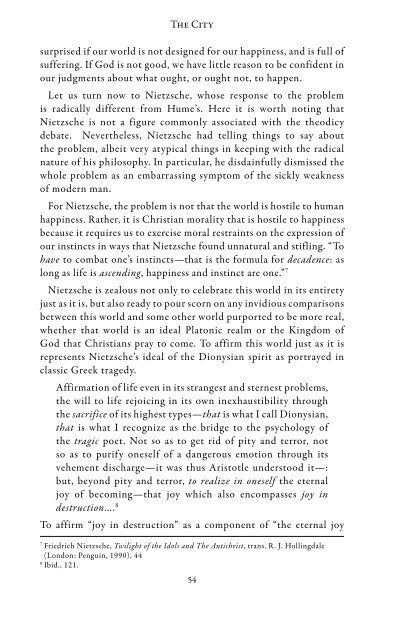THE CITY
h6c7p5d
h6c7p5d
Create successful ePaper yourself
Turn your PDF publications into a flip-book with our unique Google optimized e-Paper software.
The City<br />
surprised if our world is not designed for our happiness, and is full of<br />
suffering. If God is not good, we have little reason to be confident in<br />
our judgments about what ought, or ought not, to happen.<br />
Let us turn now to Nietzsche, whose response to the problem<br />
is radically different from Hume’s. Here it is worth noting that<br />
Nietzsche is not a figure commonly associated with the theodicy<br />
debate. Nevertheless, Nietzsche had telling things to say about<br />
the problem, albeit very atypical things in keeping with the radical<br />
nature of his philosophy. In particular, he disdainfully dismissed the<br />
whole problem as an embarrassing symptom of the sickly weakness<br />
of modern man.<br />
For Nietzsche, the problem is not that the world is hostile to human<br />
happiness. Rather, it is Christian morality that is hostile to happiness<br />
because it requires us to exercise moral restraints on the expression of<br />
our instincts in ways that Nietzsche found unnatural and stifling. “To<br />
have to combat one’s instincts—that is the formula for decadence: as<br />
long as life is ascending, happiness and instinct are one.” 7<br />
Nietzsche is zealous not only to celebrate this world in its entirety<br />
just as it is, but also ready to pour scorn on any invidious comparisons<br />
between this world and some other world purported to be more real,<br />
whether that world is an ideal Platonic realm or the Kingdom of<br />
God that Christians pray to come. To affirm this world just as it is<br />
represents Nietzsche’s ideal of the Dionysian spirit as portrayed in<br />
classic Greek tragedy.<br />
Affirmation of life even in its strangest and sternest problems,<br />
the will to life rejoicing in its own inexhaustibility through<br />
the sacrifice of its highest types—that is what I call Dionysian,<br />
that is what I recognize as the bridge to the psychology of<br />
the tragic poet. Not so as to get rid of pity and terror, not<br />
so as to purify oneself of a dangerous emotion through its<br />
vehement discharge—it was thus Aristotle understood it—:<br />
but, beyond pity and terror, to realize in oneself the eternal<br />
joy of becoming—that joy which also encompasses joy in<br />
destruction…. 8<br />
To affirm “joy in destruction” as a component of “the eternal joy<br />
7<br />
Friedrich Nietzsche, Twilight of the Idols and The Antichrist, trans. R. J. Hollingdale<br />
(London: Penguin, 1990), 44<br />
8<br />
Ibid., 121.<br />
54


